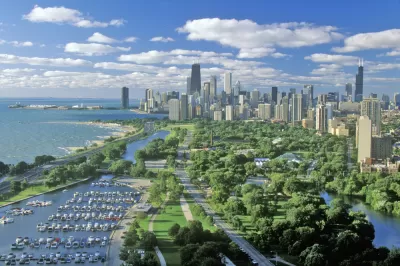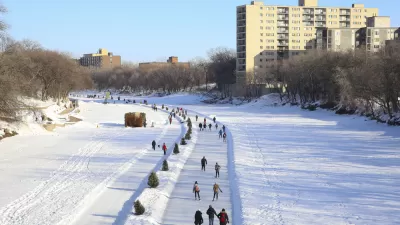New research shows that increasing park acreage in areas that face park deficits and low levels of tree canopy could lead to significant population-level increases in life expectancy.

"Parks Make Life Better" is a popular slogan used in the field of parks and recreation. It has been validated through numerous studies which demonstrate the many benefits of parks and how they indeed make life better for communities. Now new research conducted by UCLA in partnership with Prevention Institute and an advisory board of community-based organizations shows that parks can even help people live longer.
Specifically, the research offers the following findings:
- Increasing park acreage in areas that face park deficits and low levels of tree canopy could lead to significant population-level increases in life expectancy.
- Targeted investments in park infrastructure would significantly benefit the health of Latino and Black community members.
- This is especially important in communities, like South Los Angeles, where the median life expectancy is 77 years, which is well below the upper bound for the county as a whole. In Beverly Hills, less than 15 miles away, life expectancy is as high as 90 years—13 years longer.
- If all the census tracts in L.A. County expanded park access up to the county median, it could add up to 164,700 years in life-expectancy gains for residents living in park-poor tracts. Latino and Black community residents comprise almost 72 percent of the gain (118,000 years).
Written by Elva Yañez of Prevention Institute, this article further identifies various actions that should be taken to address park inequities. Examples include: developing new policies and practices and reforming existing ones to prioritize investments in communities experiencing the greatest park deficits; evaluating agency policies and initiatives to assess their impact to reverse or reinforce park inequities and make corrections as necessary; and engaging with and listening to people living in low-income communities of color that have been historically excluded from park-related decision making.
FULL STORY: More Parks, Longer Lives

Alabama: Trump Terminates Settlements for Black Communities Harmed By Raw Sewage
Trump deemed the landmark civil rights agreement “illegal DEI and environmental justice policy.”

Study: Maui’s Plan to Convert Vacation Rentals to Long-Term Housing Could Cause Nearly $1 Billion Economic Loss
The plan would reduce visitor accommodation by 25% resulting in 1,900 jobs lost.

Planetizen Federal Action Tracker
A weekly monitor of how Trump’s orders and actions are impacting planners and planning in America.

Waymo Gets Permission to Map SF’s Market Street
If allowed to operate on the traffic-restricted street, Waymo’s autonomous taxis would have a leg up over ride-hailing competitors — and counter the city’s efforts to grow bike and pedestrian on the thoroughfare.

Parklet Symposium Highlights the Success of Shared Spaces
Parklets got a boost during the Covid-19 pandemic, when the concept was translated to outdoor dining programs that offered restaurants a lifeline during the shutdown.

Federal Homelessness Agency Places Entire Staff on Leave
The U.S. Interagency Council on Homelessness is the only federal agency dedicated to preventing and ending homelessness.
Urban Design for Planners 1: Software Tools
This six-course series explores essential urban design concepts using open source software and equips planners with the tools they need to participate fully in the urban design process.
Planning for Universal Design
Learn the tools for implementing Universal Design in planning regulations.
Caltrans
Smith Gee Studio
Institute for Housing and Urban Development Studies (IHS)
City of Grandview
Harvard GSD Executive Education
Toledo-Lucas County Plan Commissions
Salt Lake City
NYU Wagner Graduate School of Public Service




























